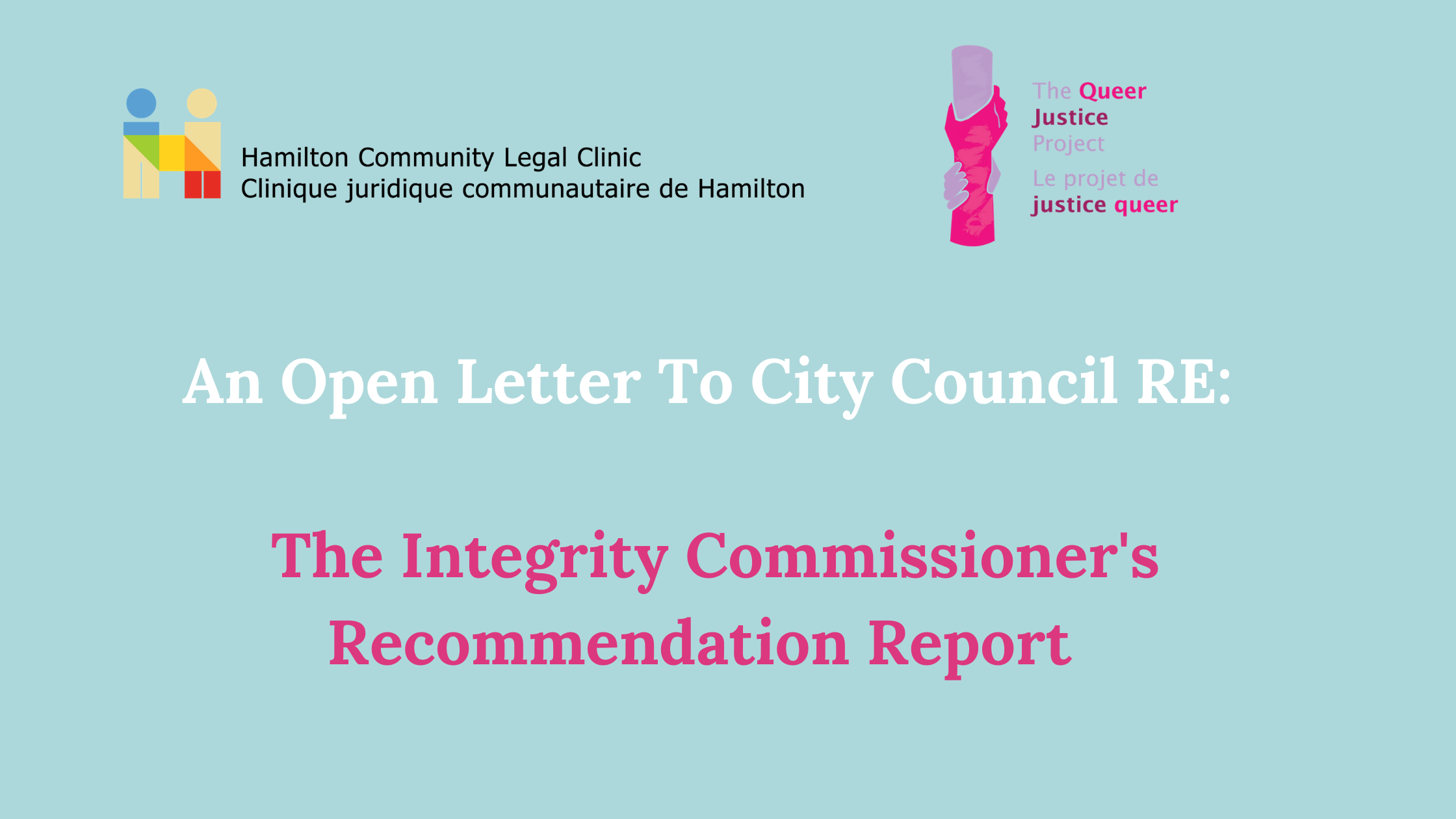
The Hamilton Community Legal Clinic and its Queer Justice Project express our significant concerns about the sequence of actions and decisions taken by Council regarding the Integrity Commissioner’s recommendation report on the complaint filed against Cameron Kroetsch. Please read our full open letter here:
2020-10-02 Open Ltr to Council re Integrity Commissioner Report

On April 1st, 2010, the Hamilton Community Legal Clinic first began its operations after amalgamating three longtime legal clinics. We are proud to say that it has been 10 years since we began serving Hamilton as one, unified clinic.
Please see our 2020 Annual Report to learn more about the work that we have been doing for the past 10 years.
HCLC 2020 Annual Report – English
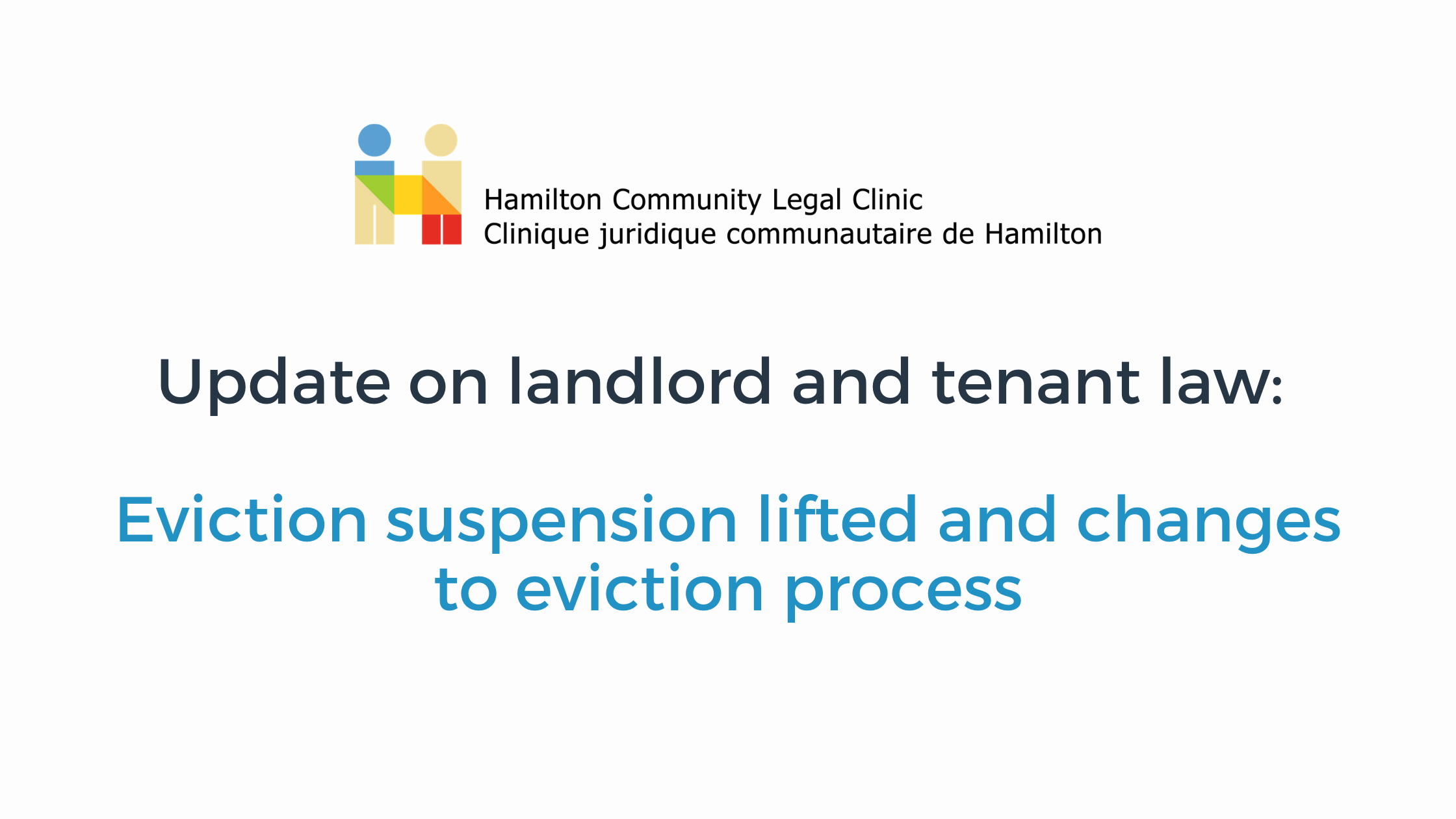
The COVID-19 pandemic eviction ban is being lifted in Ontario on August 4, 2020. This means that evictions can once again take place in Ontario. There remains a process for evictions, but for most evictions that process is now different due to recent changes to the Residential Tenancies Act. Some of the changes related to evictions and other things are as follows:
For more details about the changes to the Residential Tenancies Act, see this article produced by the Advocacy Centre for Tenants Ontario.
While the changes to the law are being challenged in court, the changes are currently in effect. We will provide an update when we have more information about the court challenge.
If you live in the Hamilton area and have any tenancy-related issues (e.g., you owe rent, your unit needs repairs), please contact the Hamilton Community Legal Clinic at 905-527-4572 or hclc.cjch@gmail.com
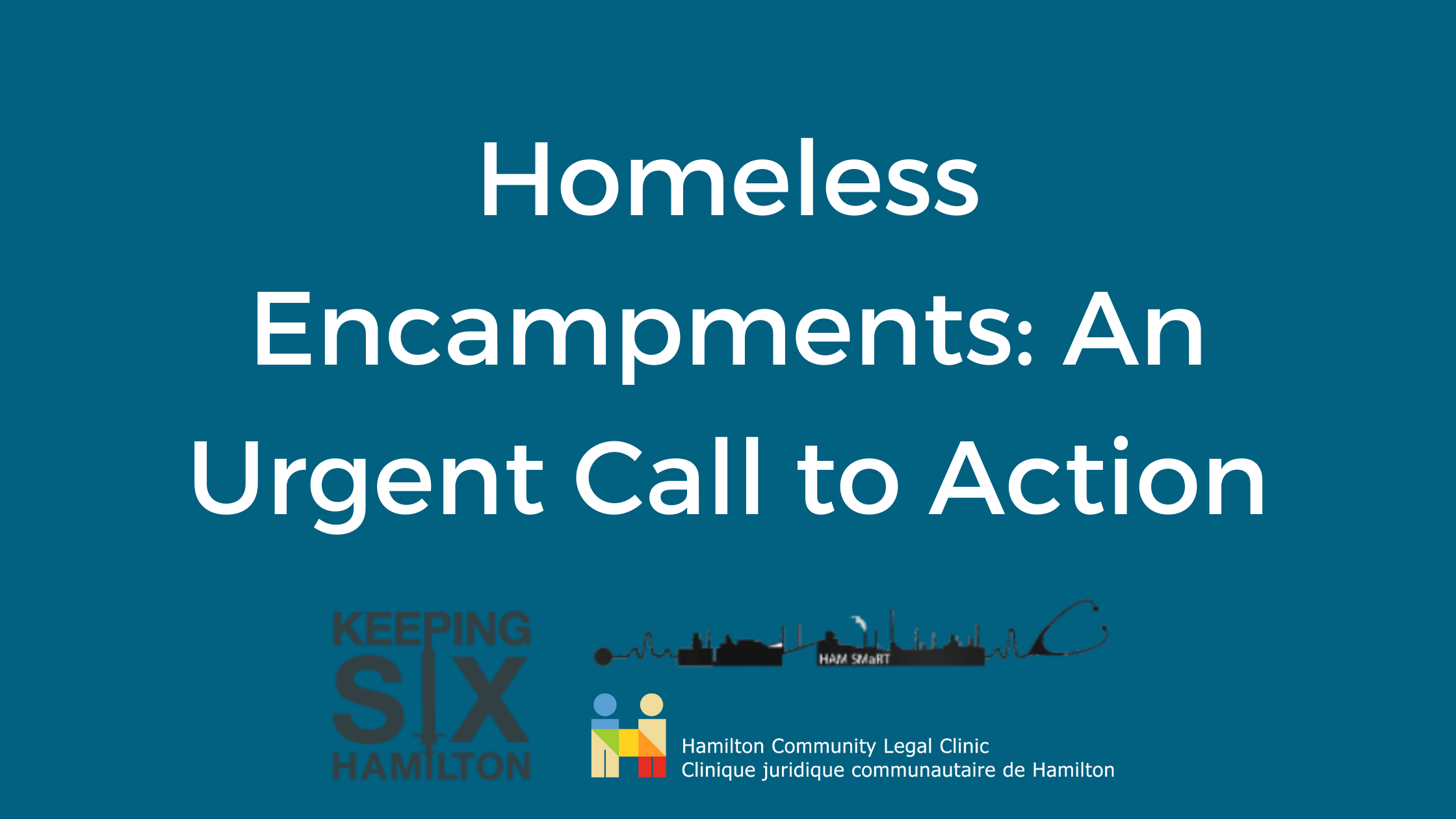
![]()

Hamilton city staff have informed HAMSMaRT and Keeping Six of their plan to dismantle the encampments at the First Ontario Centre and the Ferguson Street encampment on July 31, 2020.
Since the beginning of the pandemic, both organizations partnered with the Hamilton Community Legal Clinic and with Wade Poziomka, a human rights lawyer at Ross & McBride and called on the city to stop dismantling encampments unless it was able to provide encampment residents with access to safe indoor spaces and interim to permanent housing with the appropriate supports.
This order to dismantle the encampments comes as a surprise to a coalition of social service and outreach workers, physicians, lawyers and community allies.
We need your help!
Please call or write to your councillor today asking that:
Dismantling homeless encampments will cause harm to encampment residents and this harm is heightened by the current pandemic. We need you to call on your local city councillor to take a holistic and reasoned approach to encampments. Please contact your councillor today!
In your emails, be sure to cc the following organizations:
The Hamilton Community Legal Clinic – hclc.cjch@gmail.com
Keeping Six – info@keepingsix.org
HAMSMaRT – info@hamsmart.ca

Together We Rise – S’Élever Ensemble fully endorses the statement and demands by the Black Legal Action Center (BLAC) on Policing and Anti-Black Racism. We stand in solidarity with all agencies working towards ending Anti-Black Racism in our communities and institutions. Furthermore, we endorse the recommendations made to the Province of Ontario in the statement by BLAC, namely:
As communities and agencies continue the complex and often difficult work of ensuring that all Ontarians are treated fairly by the Justice System, and indeed all public institutions, it is important that we name and speak honestly about barriers to equity. Together We Rise applauds BLAC’s impassioned statement on Anti-Black Racism. We encourage all those working towards the goals of equity, safety and prosperity in Ontario-Hamilton or local neighbourhoods, to actively engage in the conversations about Anti-Black Racism. Collectively, we can inform the creation of effective policies and practices that will ensure all of us can contribute to improving our own living conditions and lifting the conditions of our neighbours. Together WE Rise!

The Hamilton Francophone Centre and the festival’s organizing committee invite you to FrancoFEST 2020, a summer event celebrating the Francophone community which takes place in a new innovative format. This live event showcasing talent and entertainment will surprise you, delight you, but most of all, it will bring you together to share a special moment grounded in arts and community. The Hamilton Community Legal Clinic is proud to be a partner of FrancoFEST 2020.
This event will take place on Friday June 19, 2020, from 6pm-8pm on multiple online platforms.
For more information, visit: https://www.facebook.com/events/565339331080876
The Hamilton Francophone centre is also hosting yoga sessions in French every Wednesday from 12pm to 12:45pm.
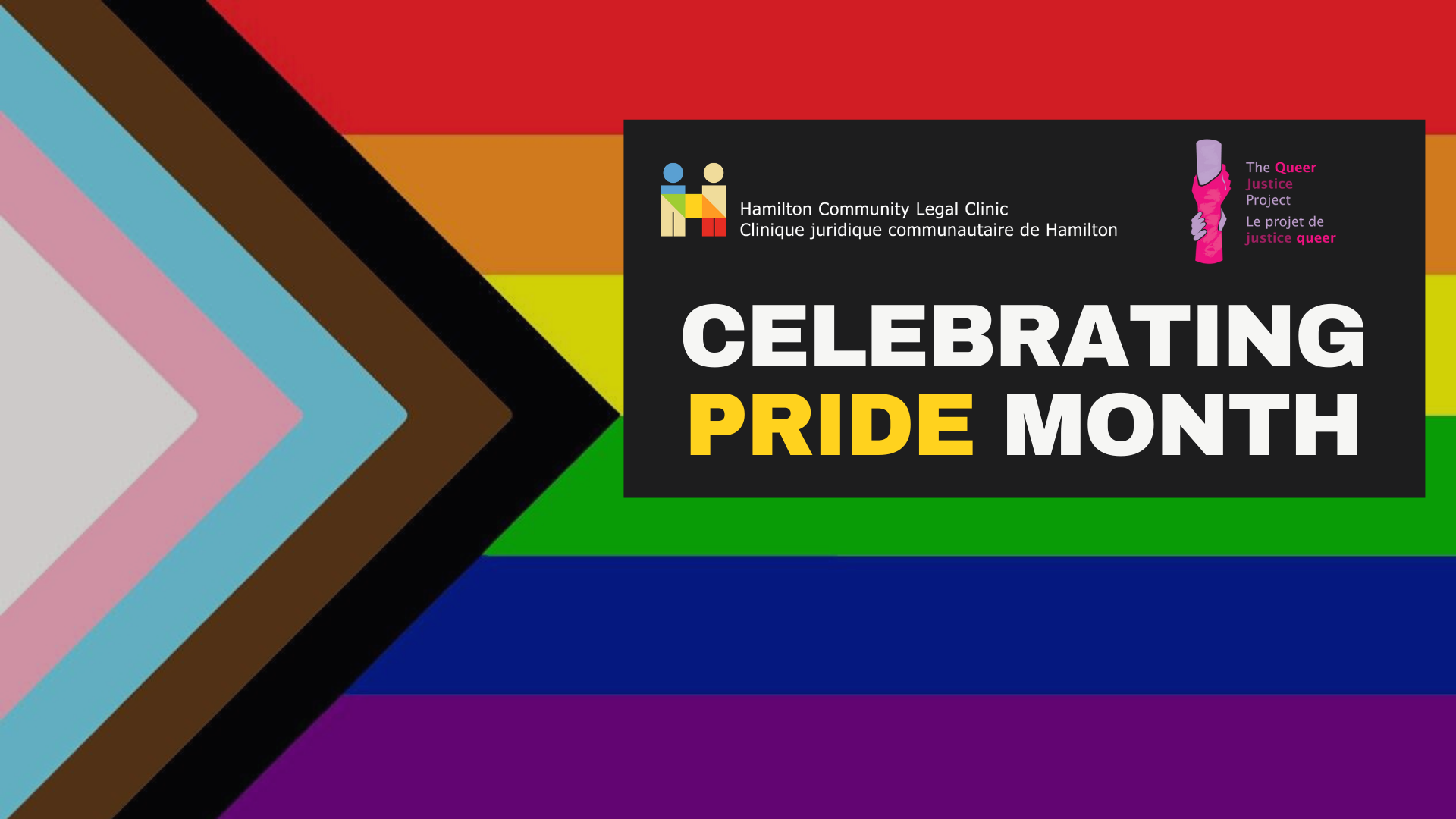
Note: The Queer Justice Project recognizes that language is important. In an effort to be inclusive, we use the language “Two Spirit and LGBTQIAPGNC communities” to de-colonize our work and represent and affirm people’s diverse identities and lived experiences. When referring to historical events, we aim to be as inclusive as possible while also being accurate to the language used when these events took place. For this reason, LGBT is used in this article when referring to historical events that used this term. However, going forward, the Queer Justice Project will use the more inclusive terminology of Two Spirit and LGBTQIAPGNC communities.
The Queer Justice Project joins the Two Spirit and LGBTQIAPGNC (Lesbian, Gay, Bisexual, Transgender, Queer, Intersex, Asexual, and Gender Nonconforming) communities in celebrating Pride Month this June 2020.
This month-long celebration takes place in June to commemorate the anniversary of the Stonewall Rebellion, which took place on June 28, 1969. On this date, the Stonewall Inn, a bar catering to LGBT patrons, was raided by police and in a ground-breaking demonstration of strength and courage against homophobia and hate, its LGBT patrons fought back in a collective uprising. Many credit Marsha P. Johnson, a black transgender activist and drag queen, of being instrumental in the Stonewall Rebellion.
The Stonewall Rebellion sparked demonstrations and led to the creation of the first LGBT Pride march. Activist Brenda Howard is known as the “Mother of Pride” for organizing the first LGBT Pride march and originating the idea for a week-long series of events around Pride Day, the anniversary of the Stonewall Rebellion. This has now transformed into a month-long celebration of Pride, where members of the Two Spirit and LGBTQIAPGNC communities and their allies celebrate every June in events around the world that commemorate the brave and courageous actions taken by folks to fight oppression and champion human rights and dignity for members of the Two Spirit and LGBTQIAPGNC communities.
In January 1979, Montreal and Vancouver each held an official Pride march and festival, becoming the first Canadian cities to do this. The Hamilton Gay and Lesbian Alliance (GALA) launched the first Pride events in Hamilton in 1991 and since then, annual events take place in June during Pride, culminating in a community festival in Gage Park.
In June 2019, the Hamilton Pride event was violently disrupted by a group of hateful protestors. An independent review of the Hamilton police is currently underway to investigate the response of the Hamilton police to the violent protests and to examine the procedure, leadership, and culture in the Hamilton police. While there has been significant progress made since the Stonewall Rebellion that initiated Pride Month, events like Hamilton Pride in 2019 demonstrate that there is still much work to be done to fight discrimination and hate. The Queer Justice Project is dedicated to educating and empowering Two Spirit and LGBTQIAPGNC communities in Hamilton and improve access to justice for members of these communities.
Unfortunately, due to the COVID-19 pandemic, the way that we celebrate Pride this year will be different. On March 25, Pride Hamilton issued a statement that Pride in the Park 2020, previously scheduled for June 20, has been cancelled due to the ongoing public health emergency. Despite this, events are being organized to celebrate the Two Spirit and LGBTQIAPGNC communities and commemorate the history of Pride, in virtual, socially-distant spaces. We recognize that it is especially important in times like these to connect with and hold space for folks and to reflect on and celebrate the resilience and strength of Two Spirit and LGBTQIAPGNC communities.
Wishing everyone a safe and happy Pride,
The Queer Justice Project, Hamilton Community Legal Clinic
Sources:
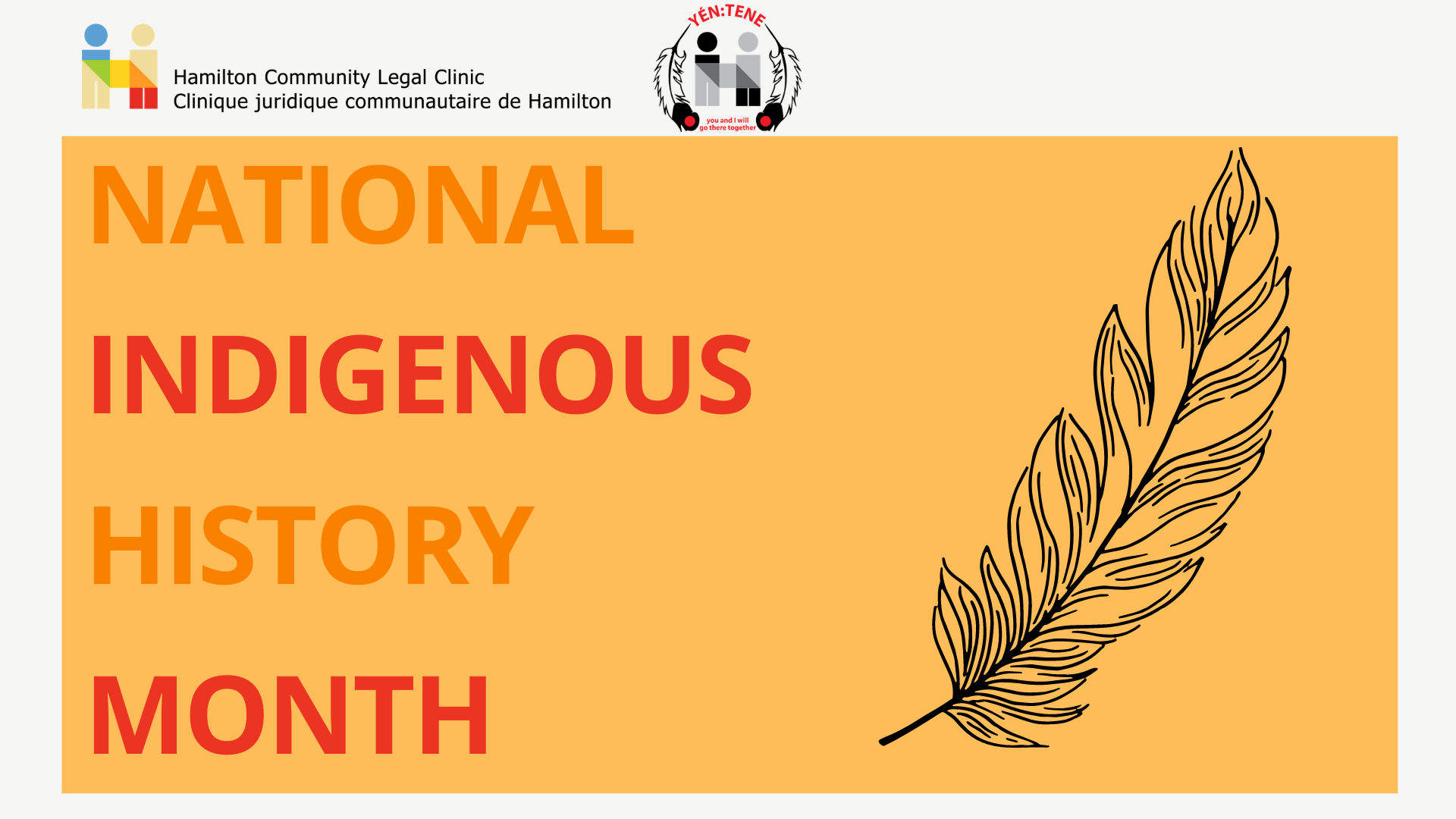
“ June is National Indigenous History Month – a time for all Canadians – Indigenous, non-Indigenous and newcomers – to reflect upon and learn the history, sacrifices, cultures, contributions, and strength of First Nations, Inuit and Metis people. It’s important to keep in mind that First Nations, Inuit and Métis Peoples each have their own unique histories. And within each group, there are distinct histories.” – Indigenous Corporate Training Inc.
The Hamilton Community Legal Clinic (HCLC) is committed to the Calls to Action and the Calls to Justice. “On May 24th 2016, the Hamilton Community Legal Clinic Board recognized National Aboriginal Day as a paid holiday, pursuant to Call to Action 80. The HCLC believes that National Aboriginal Day is an opportunity to expand awareness on Indigenous issues and promote inclusion. This decision represents the values of HCLC and its commitment to “reconciliAction”. The HCLC encourages both Indigenous and non-Indigenous organizations to consider doing likewise.” – A Journey to ReconiliAction – Calls to Action Report
Here’s the timeline on how Indigenous History Month came to be:
1982: The National Indian Brotherhood (now known as the Assembly of First Nations) called for the creation of a National Aboriginal Solidarity Day on June 21.
1990: The Quebec legislature recognized June 21 as a day to celebrate Aboriginal* culture
1995: The Royal Commission on Aboriginal Peoples recommended a day be designated as National First Peoples Day. The Sacred Assembly, a national conference of Aboriginal and non-Aboriginal people chaired by the late Elijah Harper, called for a national holiday to celebrate the contributions of Aboriginal Peoples in Canada.
1996: Governor General Romeo LeBlanc proclaimed that National Aboriginal Day would be celebrated June 21 each year. “On June 21st, this year and every year, Canada will honour the native peoples who first brought humanity to this great land,” said Leblanc. “And may the first peoples of our past always be full and proud partners in our future.”
2008: Prime Minister Harper offered the full apology on behalf of Canadians for the Indian Residential Schools system.
2009: By unanimous motion in Canada’s House of Commons, the month of June was declared National Aboriginal History Month.
2017: Prime Minister Justin Trudeau announced plans to change the name to National Indigenous History Month, reflecting a national and international preference for the term Indigenous, rather than Aboriginal.
If you are interested in learning more about the Indigenous history that was not taught in schools or if you want to learn about history from the Indigenous person’s point of view, there are lots of reports. Some are quite lengthy but well worth the effort.
Reports:


Canada was founded on racial injustice yet has a long history of denying racism as a country.
Despite human rights being protected by federal, provincial and territorial laws, racist and discriminatory stereotypes about people of African Descent permeate contemporary society and disproportionately impact the social, economic, educational, and health outcomes of Black men, women and children. Whether they are descendants of those who were enslaved or recent immigrants, people of African Descent are united by a shared, lived experience with anti-Black racism.
Hamilton Community Legal Clinic is committed to anti-racism. We share both the pain and the righteous rage communities are experiencing across Turtle Island. Sadly, the excessive impact of COVID-19 on African Canadians and the events of the last week are nothing new, but they demand a different response from civic leaders, institutions and all of us as human beings. We must move from being non-racist to being anti-racist. We must acknowledge systemic racism and take actions together in the spirit of anti-racism to disrupt patterns of oppression that punish some while privileging so many. It is time for bold leadership and action. It’s time for justice for all.
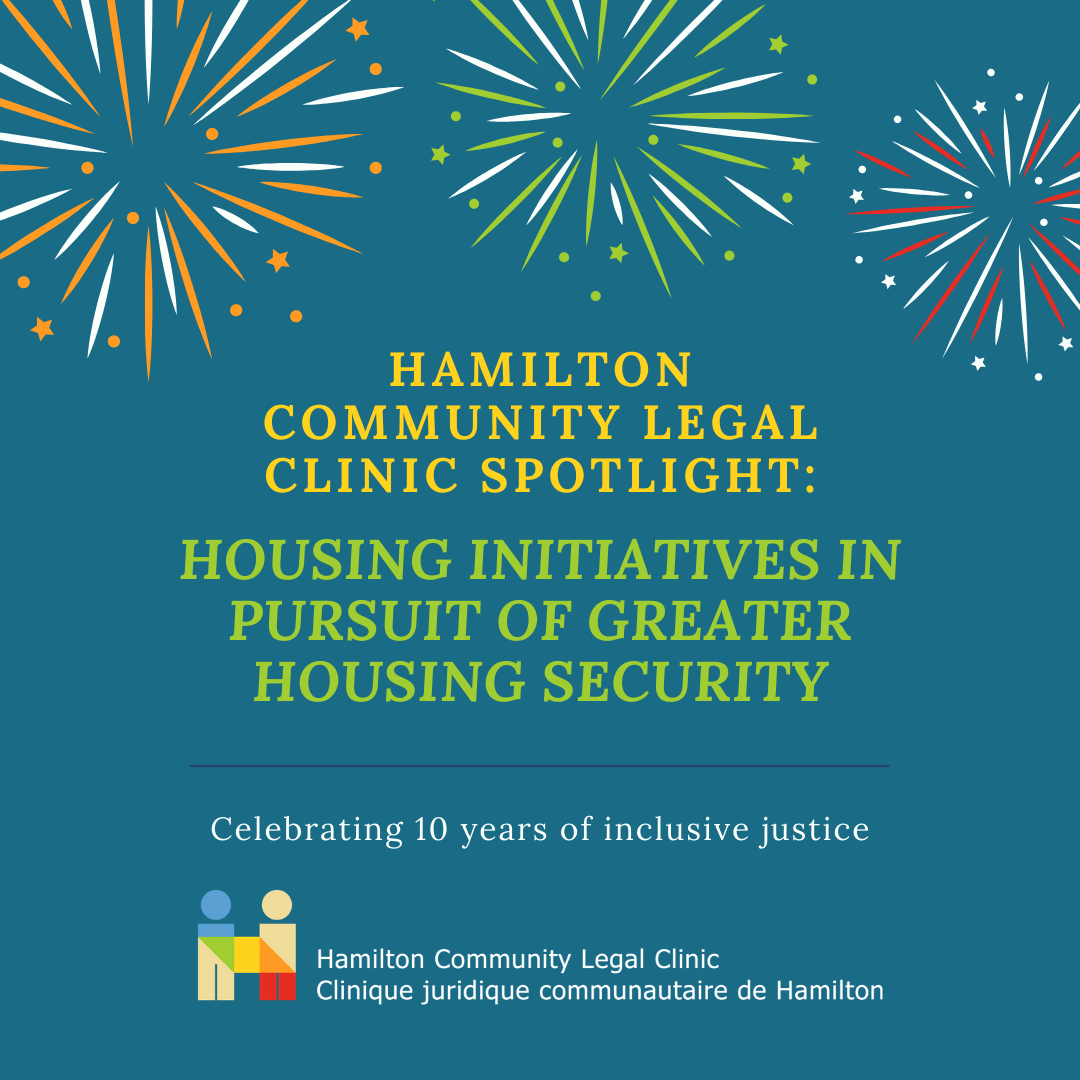
We are in the midst of the worst affordable housing crisis in the country’s history. Wages and social assistance rates are too low. Rent is too high. Here in Hamilton this pressure was becoming unbearable: 45% of Hamilton tenants were spending more than 30% of their income on rent, and 20% were spending more than 50%. In 2018, Hamilton saw the highest one-year average rent increase in all of Canada, at 24%.
The combination of a lack of rent control, increased profitability of the market and municipal “revitalization” policies has led to gentrification causing mass displacement of tenants; forcing thousands of people in Hamilton, living in precarity, to survive through the toughest times, and make every last dollar stretch for them and their families.
Landlords want to push long-term tenants out of the buildings so they can raise rents. HCLC supports apartment tenants to organize building committees which take up the concerns of all residents. Through the [Dis]placement Project and Tools for Tenants initiatives, HCLC provide(s)(d) training on housing law to tenants, tenant associations, community leaders, emerging community leaders, and service providers. These initiatives are partnerships between legal and community organizations designed to improve the capacity of frontline workers so they can provide basic legal information and referrals to their clients and to empower tenants to self-advocate thereby increasing access to justice and grassroots mobilization in response to the need for greater housing security.
HCLC zealously responds to the roots of systemic displacement by routinely advocating for policy reform at the municipal level. We successfully advocated for changes to some of the City of Hamilton’s development grant programs that unintentionally encouraged landlords to displace longstanding tenants. Additionally our advocacy resulted in the creation of the Tenant Defence Fund Pilot Project, a fund that tenants can access to cover the cost of hiring legal counsel to defend against applications for Above Guideline Rent Increases.
Unfortunately tenants have also been threatened by unlawful evictions by Hamilton Police Services (HPS), a service that does not have the authority to evict tenants protected by the Residential Tenancies Act. HCLC successfully represented two tenants in their claim of negligence causing damage for their unlawful eviction by HPS. Their settlements included financial compensation for their personal damages and require the HPS to amend their operational manual to better reflect housing law, reinforcing that they do not have the authority to evict tenants covered by the Residential Tenancies Act.